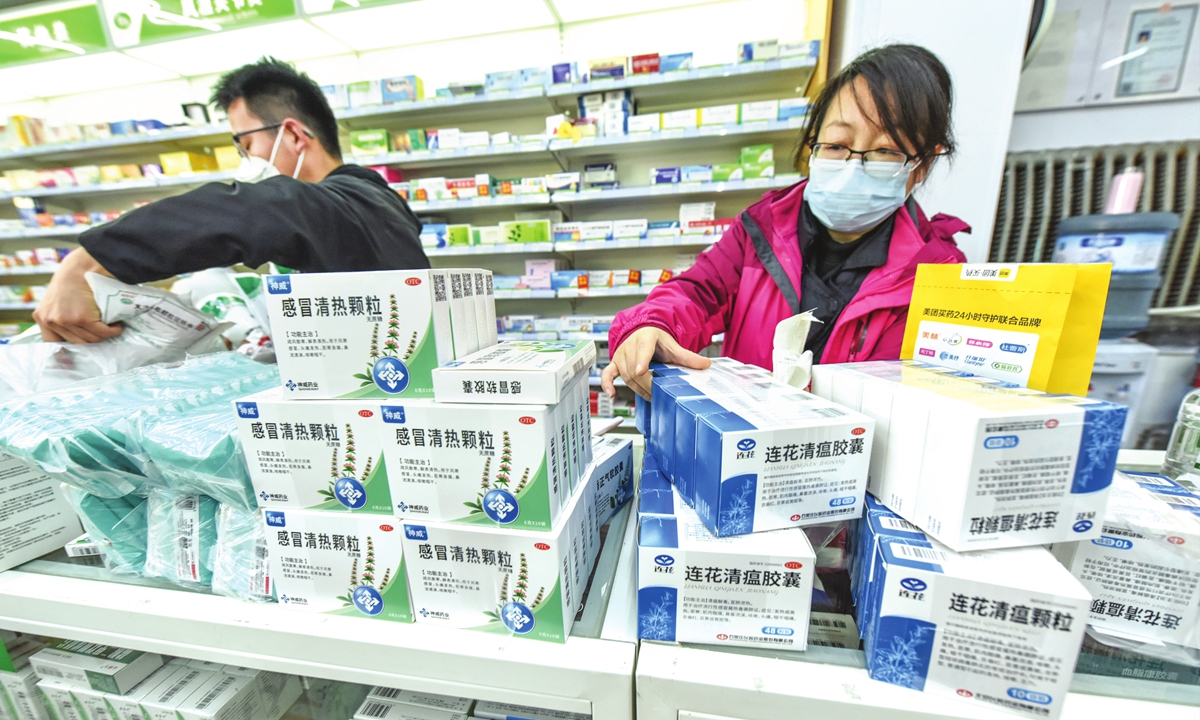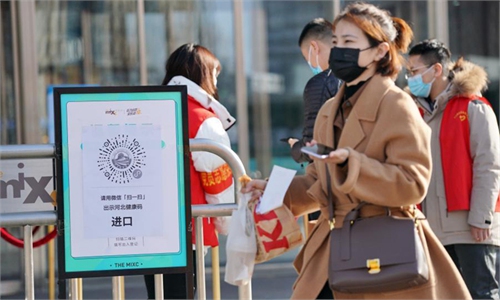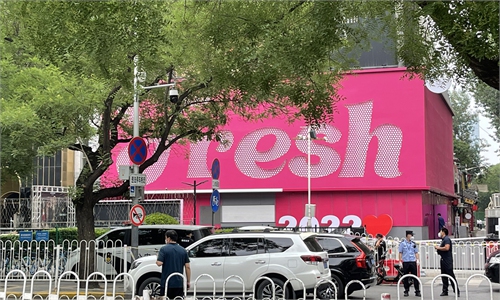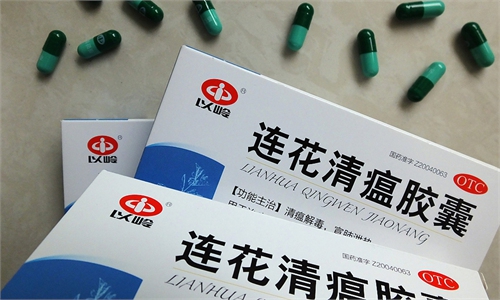Shijiazhuang, Beijing's Chaoyang refine nucleic test rules after confusion stirred
Sticking to dynamic zero-COVID the core of implementing 20 new measures

People in Shijiazhuang, capital of North China's Hebei Province, buy antipyretics and cold medications in a drugstore on November 15, 2022. These medications have become popular after the city optimized epidemic measures on November 13 in accordance with the country's 20 recently released measures to better respond to COVID-19. Photo: VCG
China's 20 new measures for optimizing the response to COVID-19 are prompting local governments to quickly adjust their policies. Some places are processing how to properly implement the new measures, while some cities, where infections are still on the rise, are facing great challenges in trying to strike a balance between implementing the new measures while properly responding to local residents' needs and concerns.
Two cities that have come into the spotlight are Shijiazhuang, capital city of North China's Hebei Province, and neighboring Beijing, where cases are piling up, especially in Chaoyang district. To deal with worries and confusion among residents, Shijiazhuang and Chaoyang soon improved their policies for the convenience of their people.
Chinese epidemiologists called for more communication and interpretation from the government to the public so as to avoid any confusion during the adjustment of policies.
They noted that sticking to dynamic zero-COVID is still the most suitable strategy for China's current situation, and the infection curve could be flattened only by sticking to strict prevention methods.
Beijing's Chaoyang district, the area of the capital that has recorded the most COVID-19 cases during the latest outbreak, announced on Tuesday that it will open 1,854 nucleic acid test points, and it will require neighborhood communities to open these sites as early as 6:30 am and keep them open until no one comes for testing.
At a conference on Tuesday, Beijing officials vowed again to only increase, not slash, test sites in places where the virus is rife, and keep up test capacity.
The announcements came after the district said a day earlier it would close some of the nucleic acid test stations and shift the testing process within housing compounds, in a bid to locate any positive cases faster and swiftly cut off viral transmission.
However, the move resulted in long lines in front of available test stations, and many residents said they could not do the test because those stations' opening hours overlapped with their working hours. But many public places and office buildings in the district still require 24-hour valid tests amid a COVID-19 flare-up.
"I used to do the test near my office building during my lunch break. But yesterday all test stations near my office were closed, and the ones in my compound closed before I got home," a Beijing resident surnamed Yuan told the Global Times. She finally did the test at a hospital after waiting one hour on line, as her office requires one-day valid test results.
Similarly, Shijiazhuang reopened some sites on Tuesday, an employee from the city's health hotline told the Global Times, noting that each district should have at least 30 stations.
On Monday, media reports emerged saying that Shijiazhuang, which recorded three confirmed cases and 541 silent carriers the day before, closed all free test stations and scrapped checking of test results in subways, buses and some public places.
The reports sparked speculation of whether Shijiazhuang was being tested for "full relaxation" or was "lying flat" in the fight against COVID-19. Zhang Chaohao, the city's Party chief, soon dismissed such claims. During his visit to a university on Monday, Zhang said that the adjustments were only to implement the 20 measures for optimizing the COVID-19 response, it was not a case of "lying flat," and definitely not "full relaxation."
A Shijiazhuang resident who gave his surname as Lu told the Global Times on Tuesday that his compound has arranged free tests, and test stations near his residence reopened on Tuesday. His office building requires two tests in three days and the subway needs valid 72-hour test results.
One of the 20 optimized measures urged against frequent testing in areas with no infections, and stipulated that testing entire districts will only be used to screen transmission chains and find the sources of infections.
In places where cases are rising, however, frequent tests are necessary to quickly identify transmission chains and flatten the curve. Deviating from this essential measure will lead to a serious rebound of infections, but the new measures should not be interpreted as reopening nor catching a breath, an expert from China's Centers for Disease Control and Prevention (CDC), who requested anonymity, told the Global Times on Tuesday.
He also suggested local governments should conduct more communication to the public prior to policies adjustment, to avoid confusion.
The People's Daily published a commentary on Tuesday in which it reiterated sticking to the zero-COVID policy. The new measures are refinements of the existing COVID-19 prevention playbook, and they are more scientific and precise measures.
They are not "relaxing prevention" or "lying flat," said the piece, which called for people to form a profound understanding and grasp of the new measures, stick to the current measures and roll out COVID-19 prevention work in a scientific manner.
The rule of virus evolution tells us that it is highly possible the virulence of the coronavirus is now weaker, said Zhang Boli, an academician with the Chinese Academy of Engineering, citing this as a scientific basis for releasing the optimized measures. Yet epidemiologists warned this is not enough for people to let their guard down in the face of the virus.
Many local governments are still in the process of exploring how to properly implement the new measures, Zeng Guang, former chief epidemiologist of the CDC, told the Global Times.
"Understanding the measures is not difficult as they are simple and straightforward, but carrying them out properly is challenging, especially in places where COVID-19 cases are surging."
Cities where no cases or few cases were recorded are streamlining nucleic test policies. The cities of Dalian and Luoyang are the latest that have cancelled frequent tests. Residents do not need to show test results when entering public places, media reported on Tuesday.
Officials from Hefei, capital of Anhui Province held a meeting on Monday, and called for securing economic development while warding off COVID-19 infections. The city also encouraged couples to hold wedding banquets under the premise of sticking to COVID-19 prevention rules.




